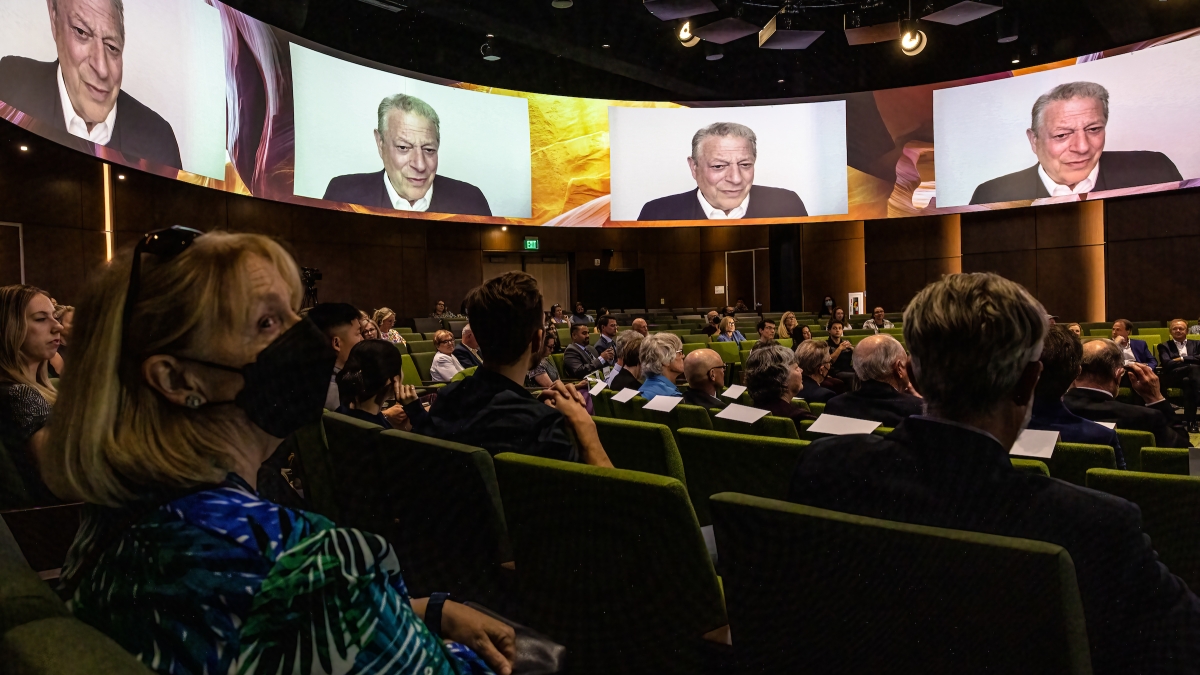Gore: Fossil fuel companies, media ecosystem threaten sustainability revolution

Former Vice President Al Gore said Tuesday night that the “media ecosystem,” fossil fuel companies and their backers, and the hyperpartisan nature of today’s political scene are responsible for the “existential threat” of climate change.
“The cause of the problem is using our atmosphere as an open sewer,” Gore said. “Those who want to offset the cost of their pollution by just spewing it for free into the sky that we all share and in the process is destroying humanity’s future … that has simply got to stop. It’s insane.”
Gore made his remarks in a virtual address that was part of the 2022 Democracy and Climate Change Conference, put on by Arizona State University’s The College of Liberal Arts and Sciences during Earth Week.
MORE: Earth Week blog roundup
The title of the address was "How Do Threats to Democracy Impact Climate Policy?"
“We are allowing democracy to be held hostage by our suicidal reliance on energy resources controlled by murderous autocrats,” Gore said. “This moment in time marked by the invasion of Ukraine should be and still could be an epiphany for our global civilization.
“It's time to change. It's not a time for moral cowardice and reckless indifference to the future of humanity. We cannot allow fossil fuel companies and their allies to cynically use this conflict as an opportunity to move us backward in the transition toward a clean and sustainable future.”
Before Gore spoke, ASU President Michael Crow said that universities have been one of the five most important institutions that have failed society relative to climate change, but that ASU is committed — as evidenced by its Julie Ann Wrigley Global Futures Laboratory — to being part of the solution rather than part of the problem.
“We’re taking on this task of how do we build a better democracy, a better platform, a better decision-making set of mechanisms, a better set of theories and philosophies and tools and assets to really help us take on this assignment of how are we going to make it in terms of our relationship with the planet?” he said.
Gore spent the first few minutes of his speech, which was broadcast into ASU’s new Rob and Melani Walton Center for Planetary Health, sharing facts about climate change’s impact on the Earth. Among them:
- Every day, 162 million human-made tons of pollution are released into the atmosphere.
- Nineteen of the 20 hottest years on the planet have been measured in the last 20 years, and in Arizona, temperatures have risen 2 ½ degrees Fahrenheit since the beginning of the 20th century.
- Of the 30.7 million people who were displaced from their homes in 2020, the large majority of them were fleeing climate-related weather disasters, including drought, famine, floods, and wildfire, not to mention sea level rise.
Gore said the flow of climate refugees has “awakened xenophobia” in some developed nations, including the United States.
“As immigrants from Latin America and principally Central America, which is one of the most vulnerable regions to the climate crisis, trek north because the extreme temperature and ongoing droughts are ruining crops and destroying livelihoods, families are making harrowing journeys to the borders of the United States only to be villainized and used as scapegoats for our country’s problems when they arrive at the border.”
Currently, 86% of the state of Arizona is in drought, including nearly 60% in severe drought. For the first time, water supply from the Colorado River is being cut due to ongoing water shortages connected to the heat and the drought.
“That means mandatory cutbacks this year for Arizona farmers, some by as much as 60%,” Gore said.
The good news?
Gore said the planet is in the early stages of a “sustainability revolution.” One piece of evidence: In 2016 there were only 1 million electric vehicles globally. By the end of this summer, that number will be at 20 million, and another 1 million electric vehicles are being added every month.
“We are in the early stages of a revolution that has the potential to completely reshape the world for the better, by transforming our relationship to businesses, the environment and to one another,” he said.
But, Gore added, the solutions needed to sustain the revolution have not been deployed at the speed and scale necessary because of the “influence of money in politics and the evolution of our media ecosystem that have led to the degradation of our system of democracy.”
Gore said fossil fuel companies have spent more than $1 billion to “capture and control policymaking process in key countries and to cynically lie to publics around the world about the climate crisis.”
By influencing both governments and media and, in particular, social media, Gore said, fossil fuel companies have created a climate change countermovement.
“They have found these kinds of strategies to be so effective that they have relied on them very heavily to overturn what the truth is and to replace it with a false vision of their own creation that leads to policies that are friendly to their bottom line,” he said.
“They have helped to foster a culture of denial doubt and extreme hyperpartisanship, one where instead of looking first at the evidence and then deciding which political position matches up with that evidence, we begin with our political identity first and then which so-called evidence our political tribe supports.”
Gore called it "AI" — artificial insanity.
“It’s not a new tactic,” he said. “The manipulation of the media ecosystem and of systems of education has been used throughout human history to undermine the will of the people.”
The difference now, Gore said, is the volume of information available and its consequences.
“We live in a culture of mass extraction where people don't feel as though they have the time to participate in their democracy and are overwhelmed by the amount of trivial information designed to capture their attention and to activate parts of the brain other than our reasoning capacity presented to them day in and day out,” he said.
“And when average citizens disengage from the process of democracy, moneyed interests are quick to step in and fill that void. When it comes to the climate crisis, the fossil fuel industry has been able to pour enormous amounts of money into this messy media ecosystem and into our governmental operations, to the detriment, not only of our democracy, but to the lives and livelihoods of people around the world. They have introduced confusion and doubt into the minds of the public, as well as our political leaders.”
Gore ended his remarks by saying there is still hope.
“I know that it's easy to feel a sense of despair and anxiety at times in the face of all the news about the future of our democracy and our planet,” he said. “We have the solutions we need right now to take action, to reduce emissions, transition to cleaner energy, improve lives in communities around the world, and clean up the air and the water and the land. And the good news further is that we can be successful in this fight.
“All we're missing is the political will, but if anybody thinks that we can't generate sufficient political will, please remember that political will is itself a renewable resource.”
Top photo: Former Vice President Al Gore speaks virtually at the Democracy and Climate Change conference Tuesday at the Rob and Melani Walton Center for Planetary Health auditorium. Photo by Charlie Leight/ASU News
More Law, journalism and politics

Annual John P. Frank Memorial Lecture enters its 26th year
Dahlia Lithwick, an MSNBC analyst and senior legal correspondent at Slate, is the featured speaker at the School of Social Transformation’s 26th annual John P. Frank Memorial Lecture on…

The politics behind picking a romantic partner
A new study reveals the role that politics play when picking out a romantic partner — particularly for older adults.“Findings show that politics are highly salient in partner selection across gender…

Tips to make tax season less taxing
When it comes to highly unpleasant experiences, filing taxes is probably up there with root canals — which is why people put off doing them. But tax season is here, and in an effort to alleviate…

